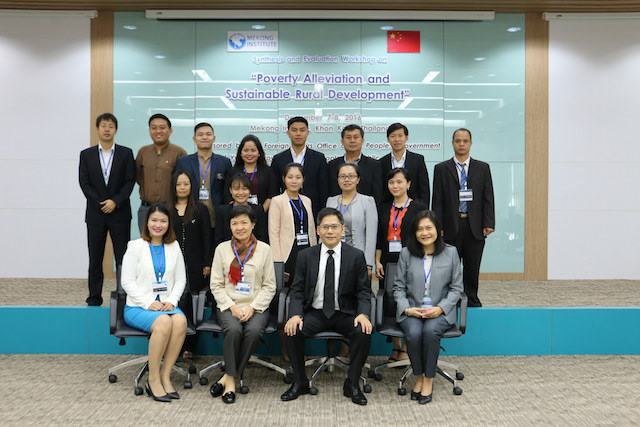To assess participants’ retention of the knowledge and skills they gained from the Regional Training Course on Poverty Alleviation and Sustainable Rural Development (PA-SRD) held last August 1 to 12, as well as to provide a venue for them to learn from each other’s experiences and outcomes during their action plan implementation, Mekong Institute is organizing a Synthesis and Evaluation Workshop on PA-SRD at the Mekong Institute Residential Training Center, Dec. 7 to 8, 2016.
Sponsored by the Foreign Affair’s Office (FAO) of the People’s Government of Yunnan Province of the People’s Republic of China (PRC), ten selected participants from Cambodia, China, Lao PDR, and Vietnam were invited to the workshop, which likewise aims to evaluate the whole modular training program, provide recommendations for its improvement and possible scaling up, and strengthen the network of PA-SRD practitioners in the region committed to information sharing and developing collaborative PA-SRD initiatives.
Welcome Remarks from Dr. Watcharas Leelawath, MI Executive Director, formally opened the workshop. Dr. Watcharas first and foremost thanked the Yunnan Province for making this workshop possible, as well as for its unwavering support to MI’s initiatives from the past until present. He likewise emphasized how Mekong Institute not only focuses on outputs, but outcomes as well, and that organizing this modular training course is one way of ensuring that what was learned during training is transferred to real-life poverty situations in small communities.
Dr. Watcharas hoped that the inputs and presentations from the workshop will help MI further improve its courses in the future. As MI’s current focus is on inclusiveness, he expects that initiatives such as this workshop would “make things better for the others”, especially the poor in rural areas.
The whole program on Poverty Alleviation and Sustainable Rural Development was designed and delivered using what MI calls the “modular training approach,” a three-phase comprehensive training program consisting of a training course, an action plan implementation period, and a synthesis and evaluation workshop.
For the first phase of the program, the participants were first invited to attend a training course on PA-SRD, and as part of the requirements of the course, were tasked to develop action plans (APs) to be carried out upon return to their respective countries. This is done in order for them to apply the knowledge and skills they obtained from the training.
During the four-month period after the training course, MI conducted regular monitoring of the activities and provided online technical support to the participants in their action plan implementation (phase two). Re-adjustments on the action plans were likewise made to address some of the difficulties and implementation constraints.
Afterwards, the participants submitted their action plan implementation reports, which were reviewed by MI. The Synthesis and Evaluation workshop, which is the third and last phase, will then serve as a platform for the participants to present the results of their action plan; share and analyze implementation constraints, positive insights and experiences, and lessons learned; and plan for next steps, if feasible.








